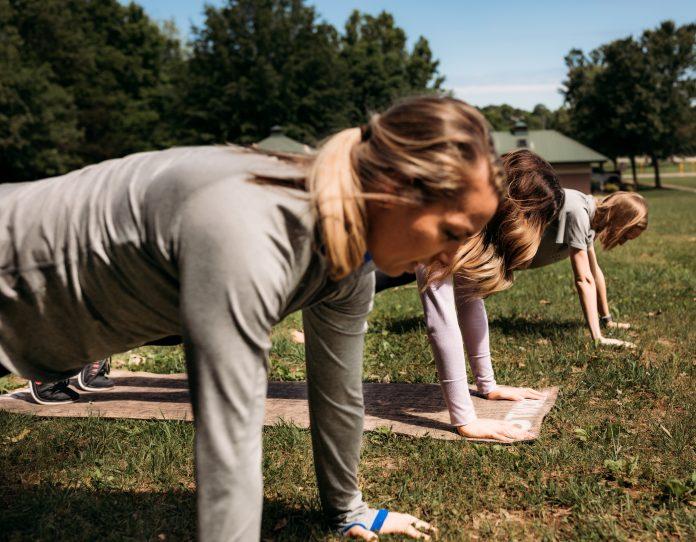What is it about the holidays that makes fitness so difficult?
October, November, and (of course) December can be summed up into 4 simple words: increased stimulus and decreased time. In the fitness realm, the major issue with this is our expectations for weight loss or simply maintaining weight stay the same.
Below there are a set of reflective questions so that you can make the holidays and your fitness routine work for YOU. My most successful clients in my fitness consulting business stick to what works for them rather than what I tell them they should be doing! You’re the one that gets to choose what your fitness routine looks like based on your needs and the needs of your family. So settle in, and take some time to reflect on what you can take from this.
I don’t have a magic wand to create more hours in the day or to make time slow down during December. I don’t have the “secret” to keeping the weight off during December (there is no secret, btw) so that you don’t feel the need to lose the 20 lbs (which you likely didn’t gain) by the end of January. If you came to this blog looking for me to tell you exactly how to balance your fitness, nutrition, and hectic schedule, I am sad to report you won’t find it. That’s because we are all different people in different bodies. You body is different than mine, you might like different exercises than me, and for a long time we have believed that fitness and nutrition should be cookie-cutter style: “If I eat like her, I will look like her,” “If I do her booty band workouts, my butt will looks like theirs,” the list goes on, and on, without any scientific evidence that actually works.
Increased Stimulus and Decreased Time: Workouts
Why am I exercising and what are my expectations for workouts?
If you are competing for something (a race, powerlifting competition, specific sports related game, a physique/bodybuilding competition) there is a specific amount of rigidity that will come with the intensity of your workouts and the time you dedicate to them. That can cause burnout on its own, so what about if you DON’T fit in this competitive category? You might be exercising because it makes your body and mind feel good, the numerous health benefits, or maybe for vanity. There is nothing wrong with that, to a point. Consistent yo-yo dieting in combination with the “all or nothing” makes exercising very easy to avoid.
Is my expectation about exercise so rigid that I am not utilizing other options to move my body in a way that makes me happy?
There are plenty of ways to stay active outside of the gym. Going on walks with your family, taking a hike, going sledding, skiing, ice skating, playing in the snow with your kids, some of us are even lucky enough to chase the kids around the beach on Christmas Day. All of these activities can make our bodies feel good in the same way a gym session does. Oftentimes my clients enjoy different environments to break up the monotony of a 6-8 week strength program and remind them that fitness has no boundaries and can be experienced in multiple settings.
Am I willing to say “no” to other events so that I can exercise?
This one is pretty self explanatory. There are so many hours during the day that you can get things done. Your life is meant to be enjoyed, and in order to enjoy the nostalgia of the holidays it is ok to reduce the amount of time that you spend exercising (if you need someone to give you permission!). Unless you are preparing for a competition of some kind, you lose very little progress in the span of a month if you reduce your gym time by a day or two per week. On the other end, maybe saying “no” to dozens of additional holiday activities is what you need. There might need to be less “busy in your schedule so that you can make time for your health. I use health here as a multifaceted term: it could be more time in the gym, but it also could be making sure that you get more rest, stay consistent with your nutrition, reduce your alcohol consumption, and spending your time investing in activities that fill your cup.
Am I getting enough sleep and eating enough food to ensure that I have the energy to workout and recover?
During any month of the year, burning the candle at both ends is only sustainable for a while. During the holiday season, it’s darn near impossible. There’s a direct correlation to acute illness and decreased sleep during this time of year. Have you ever wondered why you might feel drained after the holiday season? Take a look at your sleep and what you are doing with your free time. On the other hand, if you are someone that is used to operating off less calories and expecting yourself to practice additional restriction through the holidays, know your body is going to have to run off something if you’re getting less sleep than usual. So if you find yourself eating calorie dense foods and “can’t seem to stop,” take a look at how much sleep you may (not) be getting.
Increased Stimulus and Decreased Time: Nutrition
How is your relationship with food in December different from January?
Holiday food brings about a level of nostalgia when it comes to food. And here’s the thing: there’s nothing wrong with the emotional tie that we have to food! It is supposed to be enjoyed! Where a lot of us get this wrong is we spend all December (AND Oct.. AND Nov..) saying “screw it! I’ll start again in January!” There’s not a need to do that- you have permission to enjoy any food you want at any time of the year. Once we come to terms with accepting that food doesn’t have a morality, its a lot easier to stay consistent with nutrition and find balance between satisfying both the nutritional and emotional needs of our bodies.
Am I willing to say “no” to holiday foods in order to maintain a specific physique or number on the scale?
Another way to ask this is: “why do I feel the need to do this?” What is it about maintaining that physical standard that gives you worth? If we look at the realistic weight gain a person experiences during October through December it is quite minimal. We might experience some additional water retention from increased calories or higher processed foods, but that would resolve itself once the holiday season ends. However, on January 2 of each year we feel the need to reduce ourselves by means of restriction and punishment. By March of the new year, we find ourselves reverting to old ways. That tells me one thing: it’s not our self control that’s the issue, it’s buying into an unrealistic (and likely unhappy) version of ourselves that culture has sold us on.
Increased Stimulus and Decreased Time: Rest
What, if anything, do I want to do differently than last year?
How many times have we finished another holiday season feeling drained saying we are going to do things differently the following year only to stretch ourselves so thin that next holiday season? This is a great journaling or goal setting opportunity to practice self adjustment monthly before we get to October! If your goal is to spend less time doing last minute holiday shopping next year: what are small goals that you can meet each month to successfully reach that by December?
Much like fitness, it’s important to find your own healthy balance. That looks different for everyone! As I have gotten older I have found that I enjoy the slow of the holidays and not rushing. I feel that I have been intentional with my time with my family and with myself. It leaves me energized for the New Year and I don’t feel the need to overload myself with that I “could have” done better from the months of October to December. Most importantly, it does not leave me feeling like I need to change my body or punish it for the sweets I ate and the hours I didn’t spend in a gym.











